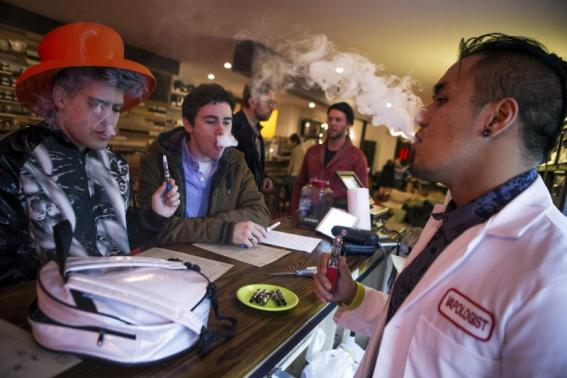E-cigarette is addictive, habit-forming & very toxic by inhalation

LONDON – The health warning on a MarkTen electronic cigarette package is 116 words long.
That's much longer than the warnings on traditional cigarette packs in the United States. Nicotine, the e-cigarette warning says, is "addictive and habit-forming, and it is very toxic by inhalation, in contact with the skin, or if swallowed." It is not intended for women who are pregnant or breast-feeding, or people ... who take medicine for depression or asthma. "Nicotine can increase your heart rate and blood pressure and cause dizziness, nausea and stomach pain," says MarkTen, a leading brand in the United States. The ingredients can be "poisonous."
MarkTen's parent company Altria, maker of Marlboro cigarettes, said the language seemed appropriate. There is no required health warning on electronic cigarettes in the United States, so "we had to do what we thought was right," said a spokesman for Altria Client Services.
The company's frankness about the perils of nicotine dates back to the late 1990s, when it led a campaign for cigarettes to be regulated by the U.S. Food and Drug Administration (FDA). Small tobacco companies at the time said the big guys would use regulation to seal their dominance. Today, small e-cigarette makers are saying the same thing. Many argue that firms like Altria and Reynolds American want hefty rules to help neutralize the threat that e-cigarettes pose to their businesses. By accentuating the risks of 'vaping,' they say, big firms may deter smokers from trying the new devices, even though most scientists agree they are safer.
"If you read that (warning) as a smoker, you might think 'Oh, I'll just stick with a cigarette,'" said Oliver Kershaw, a former 15-a-day-smoker who quit through e-cigarettes and founded websites that advocate them.
Big tobacco companies have pushed for a range of controls on e-cigarettes. These include lengthy health warnings, reduced product ranges, restricted sales, and scientific testing requirements. Kershaw and others say such efforts risk squeezing small players. Too many rules would stifle innovation and reduce the range of products to "a very simple, utilitarian e-cigarette," said Fraser Cropper, CEO of Totally Wicked, an independent e-cigarette company based in the UK.
Big tobacco companies say their goal in pushing for firm control is not to hurt smaller competitors. Regulation will benefit consumers and e-cigarette companies alike by ensuring safety and quality standards and boosting confidence, they say. Small companies should not be exempt from responsible behavior.
"Our stated goal is to get to e-vapor leadership, to have the strongest brands in the marketplace," said the Altria spokesman. He could not predict the impact of increased regulation on smaller firms. "I don't know how they run their businesses and what it would cost them to meet those requirements."
Most anti-tobacco campaigners agree that e-cigarettes should be regulated. But some believe they deserve a lighter touch than tobacco because they can help smokers quit, and may be less harmful than smoking.
Measures that make e-cigarettes less appealing or hard to come by may keep people smoking, these people say. Clive Bates, a former head of UK charity Action on Smoking and Health (ASH), thinks public health officials who advocate tough controls end up helping Big Tobacco's conventional brands.
"They really are all doing their utmost to protect the cigarette trade," Bates said. "They just don't realize it." He thinks regulations should encourage smokers to quit, or switch.
The image of e-cigarettes is already changing. The proportion of people in Britain who think vaping is just as harmful as smoking doubled last year to 15 percent, according to a survey by ASH. In the United States, a similar picture is emerging. The growth in U.S. sales of e-cigarettes slowed to 5 percent in the fourth quarter last year from 19 percent a year earlier, according to Wells Fargo analyst Bonnie Herzog. She attributes that partly to increased uncertainty about the products. –Reuters







